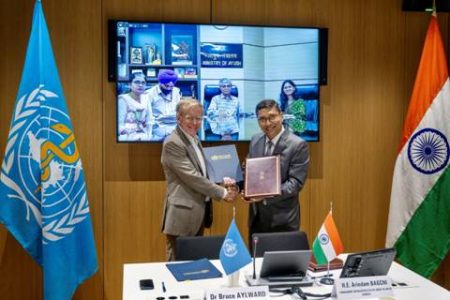Geneva, Switzerland: The Ministry of Ayush, Government of India, and the World Health Organization (WHO) have signed a significant Donor Agreement, formalizing financial terms to support the activities of the WHO Global Traditional Medicine Centre (GTMC) in Jamnagar, Gujarat. The signing ceremony took place at WHO Headquarters in Geneva on July 31, 2024.
The agreement was signed by H.E. Mr. Arindam Bagchi, Permanent Representative of India to the UN, Geneva, and Dr. Bruce Aylward, Assistant Director-General for Universal Health Coverage and Life Course, on behalf of the Ministry of Ayush and WHO respectively. The event saw virtual participation from Vaidya Rajesh Kotecha, Secretary of Ayush, and was moderated by Dr. Shyama Kuruvilla, Director a.i. of WHO GTMC, with a vote of thanks delivered by Dr. Razia Pendse, Chef de Cabinet, representing the Director-General of WHO.
Through this collaboration, the Government of India will donate US$ 85 million over ten years (2022-2032) to support the operations of the WHO GTMC. The Donor Agreement acknowledges the WHO GTMC as a key knowledge hub for evidence-based Traditional Complementary and Integrative Medicine (TCIM), aiming to enhance the health and well-being of people and the planet.
The establishment of the WHO GTMC was formalized with the Host Country Agreement signed on March 25, 2022, marking it as the first and only global out-posted Centre for traditional medicine worldwide. The interim office of WHO-GTMC is already operational, developing capacity-building and training programs in collaboration with the WHO Academy and other strategic partners.
The Ministry of Ayush has a longstanding collaboration with WHO, contributing to various initiatives such as developing benchmark documents for training and practice in Ayurveda, Unani, and Siddha systems, creating WHO terminology for these practices, and introducing a second module in the Traditional Medicine Chapter of the International Classification of Diseases-11. Additionally, the Ministry has supported the development of apps like M-Yoga and the International Pharmacopoeia of Herbal Medicine (IPHM).
These collaborative efforts, including the establishment of WHO GTMC, will position traditional medicine on the global stage, benefiting not only India but also contributing to the global health agenda. This partnership reinforces the commitment to achieving the Sustainable Development Goals through traditional medicine.
“The collaboration between the Ministry of Ayush and WHO is a testament to our shared vision of promoting traditional medicine and integrating it into the global health system,” said Vaidya Rajesh Kotecha. “This initiative will not only strengthen India’s role in traditional medicine but also contribute to global health and well-being.”

